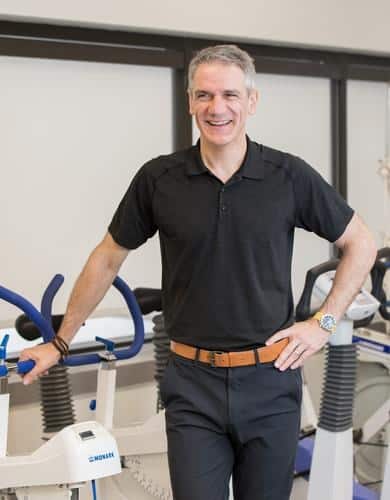
The most magical words a teacher can hear from a student is ‘That was the best course ever’, and after Dr. John Holash completely re-vamped a kinesiology course into a course-based undergraduate research experience, he heard those words from not only one, but many students.
Holash, PhD, an instructor in the Faculty of Kinesiology, had wanted to update his Kinesiology 375 ‘tests and measures’ exercise physiology course for some time to make it more relevant and engaging for students, but found it difficult to find the time or resources to do so.
“Previously in the course, students followed set guidelines to test people’s physical fitness and created a lab report on the results. But the reports were not in a form they could give to a fitness client, or a coach in the real world. I wanted them to think of a potential client and create something useful,” says Holash.
Holash learned of the Taylor Institute for Teaching and Learning’s program where instructors are given the tools to implement a course-based undergraduate research experience or CURE, a great opportunity to update the course. To help him implement a research-based curriculum, he hired two graduate student research coaches, Keenan MacDougall and Krystyna Teresa Sadowski, with funds from the College of Discovery, Creativity and Innovation (CDCI).
Students create their own research procedures
The revised course had students create a research question and answer it. They started with defining a fitness criterion. The students asked questions such as “How much core stability and strength would affect a Paralympic athlete’s ability to shoot a basketball from a seated position?” and “Can you climb Mount Everest?”
To answer these questions, the students had to create the appropriate tests and measures for the conditions a potential client would face, and report on it in a way similar to professional approaches.
For example, the Mount Everest team developed a test to see how well clients could tie knots in extreme conditions by having them immerse their hands in cold water and while wearing bulky clothes.
Holash was impressed with the creativity the students were demonstrating, but would they appreciate building the research fitness testing protocol themselves?
Sadowski, who collected the feedback forms on the course, reports the student response was extremely positive. Responses included statements like ‘This is the most meaningful course I ever took’ and ‘Best course of my undergraduate degree to date’.
Just as Uber changed the transportation system, Holash says he believes the fitness industry will undergo a technological transformation too and wants to make sure kinesiology students lead the way when it happens.
Written by: Stacy McGuire, Faculty of Kinesiology, and Kara Loy, Taylor Institute, of the University of Calgary; used with permission.
Please visit here to read the original article.
Founded in 1978, the Council on Undergraduate Research (CUR) focuses on providing high-quality and collaborative undergraduate research, scholarly, and creative activity. Among the many activities and networking opportunities that CUR provides, the organization also offers support for the professional growth of faculty and administrators through expert-designed institutes, conferences, and a wide-range of volunteer positions. The CUR community, made up of nearly 700 institutions and 13,000 individuals, continues to provide a platform for discussion and other resources related to mentoring, connecting, and creating relationships centered around undergraduate research. CUR’s advocacy efforts are also a large portion of its work as they strive to strengthen support for undergraduate research. Its continued growth in connections with representatives, private foundations, government agencies, and campuses world-wide provides value to its members and gives voice to undergraduate research. CUR is committed to inclusivity and diversity in all of its activities and our community.
CUR focuses on giving a voice to undergraduate research with learning through doing. It provides connections to a multitude of campuses and government agencies, all while promoting networking and professional growth to its community.


